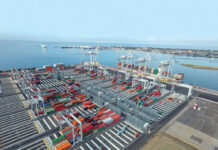BlueWeave Consulting, a leading strategic consulting and market research firm, in its recent study, estimated that the size of Global Internet of Things (IoT) in Logistics Market was worth USD 37.41 billion in 2021. Global IoT in logistics market size is projected to grow at a significant CAGR of 14.0%, reaching a value of USD 93.85 billion by 2028. IoT in logistics market across the globe is booming because of the technology advancements that assist the logistics industry in seeing rapid transformation and growth. The phrase “Internet of Things” (IoT) in the context of logistics refers to a supply chain that is entirely digital, adaptable, and connected and is optimized for e-commerce, last-mile delivery, and last-minute purchases. Applications of IoT in logistics include self-driving vehicles, drone delivery, location management systems, inventory tracking and warehousing, predictive analysis, and blockchain for the supply chain management. Due to the use of cutting-edge technologies, digitalization has permeated the transportation and logistics sectors. However, a lack of skilled workers, excessive costs, and stringent government laws and regulations could limit the growth of global IoT in logistics market.
Rapid digitization driving demand for IoT in logistics
Rapid digitization is one of the key IoT trends in the logistics sector. The trucking and logistics industries are incorporating data analytics, robotics, analytics, and self-driving technologies to increase operational effectiveness and address other issues, such as the shortage of truck drivers. To address the general labor shortage and boost technical efficiency, robots and robotic technologies are also increasingly used in warehousing, supply chain management, machine learning (ML), and data analytics. Such digital transformation techniques are a significant market trend in logistics operations. This results in offering lucrative opportunities for global IoT in logistics market during the forecast period (2022–2028).
Request for Sample Report @ https://www.blueweaveconsulting.com/report/internet-of-things-in-logistics-market/report-sample
Thriving e-commerce and smart cities to support market expansion
Future market growth will be fueled by smart cities, e-commerce, and the high adoption of sensors across verticals. Due to digitization and shifting customer expectations, the logistics industry is undergoing unprecedented changes. Lockdowns and other government restrictions caused logistics companies to make significant investments in IoT as consumers and businesses turned to online channels for shopping during the COVID-19 pandemic. Innovative technologies are not only improving efficiency and collaboration but also reshaping how business is done in ways that have only recently started to take shape. The industry is changing because of startups, sector-specific clients, and suppliers. Furthermore, supply chain transparency will be made possible by technologies, such as IoT sensors.
Challenge: High concerns for users’ safety
Despite being state-of-the-art technology, IoT’s effects and uses are still not fully understood. The market’s increasing rate of security breaches and data collection will make it more difficult for logistics companies to increase their IoT spending. These obstacles will have a significant impact on the IoT spending by the logistics market, safety, and discretion. It gets harder to maintain the security of the data that IoT devices collect and transmit as they mature and become more widely used. These trends may limit the expansion of global IoT in logistics market.
Segmental Coverage
Global Internet of Things (IoT) in Logistics Market – By Application
Based on application, global IoT in logistics market is segmented into Fleet, Freight, Warehouse, Yard/dock, and Others. Among these, IoT in the Fleet segment increases driver safety, eliminates driver fraud, extends vehicle life, and helps logistics companies better manage fuel and maintenance costs. These benefits drive individual category growth in the IoT in logistics market. Logistics companies may carry out these fleet management tasks more effectively by utilizing IoT technology.
Impact of COVID-19 on Global Internet of Things (IoT) in Logistics Market
The market for IoT in logistics has been significantly impacted by the COVID-19 pandemic. Events across the globe have had a significant impact on the IoT sensor supply chain. IoT and sensor deployment has been put on hold for many projects because of a shrinking workforce and a delay in the supply of hardware. Many manufacturing facilities cut production because of the pandemic’s effects on the supply chain, which slowed down demand for IoT products among the manufacturing units. On the other hand, the pandemic has accelerated the shift to “work-from-home” setup, raising the demand for automation and remote management. IoT systems are now given more attention, especially for increasing operational effectiveness and cutting costs.
Competitive Landscape
Leading market players in global IoT in logistics market include Amazon Web Services (AWS), BICS SA/NV, Bosch Software Innovations GmbH, Cisco Systems Inc., Honeywell International, IBM Corporation, Intel Corporation, Kaa IoT Technologies, LLC., NEC Corporation, Novire Technologies, Octonion SA, Oracle Corporation, PTC Inc., Rockwell Automation, Inc., and SAP SE. Global IoT in logistics market is highly fragmented with the presence of several manufacturing companies across the globe. The market leaders retain their supremacy by spending on research and development, incorporating cutting-edge technology into their goods, and releasing upgraded items for customers. They use various strategies, including strategic alliances, agreements, mergers, and partnerships.
Contact Us:
BlueWeave Research Blog
Phone No: +1 866 658 6826
Email: info@blueweaveconsulting.com














